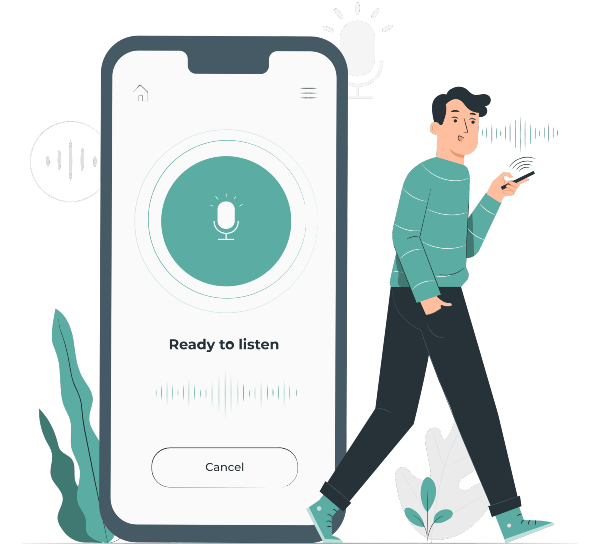There are probably even voice search skeptics among the readers of this article. For what? – You will ask. We'll let the numbers do the talking:
- Humans can speak 150 words per minute vs. 40 words written per minute.
- 28% of people believe that voice search is a more accurate way to find an answer.
- 43% of people say that using voice search is faster than using a website or an app.
- 42% say driving is a good reason to use voice search.
- 21% of search engine users simply don't like to type on their mobile phone, and for this reason, they resort to voice search. (Statistics source: Hubspot Statistics).

In 2016, Google launched the equivalent of Amazon's Echo or Alexa, which is called Google Home and is also called the new "Genie in a Bottle" of the 21st century.
So let's get to the point.
How does voice search affect SEO optimization?
The good news is this: Voice search doesn't mean you have to overhaul your entire SEO strategy or your entire website content, but it does mean you'll need to make some small changes that can help you be more successful in voice searches.
First of all, you need to have a mobile-friendly website. Not that this would have been new, but now you also lose the Voice Search segment without a responsive version of the site. Of course, you already know that without a responsive design, Google doesn't even promote you in the results of searches performed on mobile phones (analysis says that now about 55% of searches take place on a mobile phone.
Indeed, people don't search the same in text and Voice Search. In the second case, it's a natural expression, almost like human to human, and that changes the game a bit.
Voice search keywords usually start with a question: "what, ” "how," "who, or "where.

Back to SEO, our advice would be to create a Q&A page that contains this particular form.
Of course, Google is smart enough to show your site in results for relevant searches, and when it comes to queries (the only condition would be that they understand very well what you do and what niche you represent - even without formulating the content yourself in the form of questions - answers). But let's not forget that we are still talking about robots. As smart as they are, they still make mistakes sometimes. That's when SEO comes in to fix the imperfections.
So how do you integrate Q&A content?
- Structure your text with headings, and formulate each heading in such a way that it begins with a question. Easy to do and easy to understand by users and search engine bots. Win-win-win.
- Create an FAQ page - it will not only be useful for voice searches but also save you some work with potential partners or customers.
- Structure the whole site well: provide a robust architecture for your site - clear, intuitive categories, subcategories, and well-linked internal content.
- In addition to good site architecture, add microdata (business location, phone number, price), and schema markup – these work in Desktop searches, and analysis shows that schema markup matters a lot, especially when we talk about voice searches.
Out of 10,000 popular searches starting with question words (who, what, where, why, when, how), it was found that over half (53%) of the results had Rich Snippets.
Experiment: 1,000 voice searches were performed with Google Home. Let's see how many of the 1,000 searches yielded voice responses equivalent to the top charts that appear on the Desktop.
The short answer is: 71%.

Looking deeper, it seems that this percentage is dependent on the type of Snippet:
- The "text" snippets in the 1K search data set yielded voice responses 87% of the time.
- "List" snippets dropped to just under half.
- The "table" type snippets generated only one-third of the voice responses.
This makes sense - long lists and most tables are simply harder to translate into voice.

How does voice search work?
Many people use voice search to get information about local businesses they want to visit. One could search for something like: "Where is the best restaurant in Chisinau?"
In this case, you want to make sure you optimize the content of your pages for "best restaurant in Moldova, right? Adding natural language to your website content will help you not only with voice search results but also to be closer to the average user.
The bottom line: once voice searches move even more to the long tail.
Voice searches require you to think "like a human."
As strange as this may sound, for a long time, SEO was only made for search engines, a bit spammy and a bit too robotic.
Now, the user is in the foreground. You must address him directly.
That should be easy enough, right?
Gone are the days when you simply tried to influence an algorithmic bot by taking a few keywords and focusing your content on them.
Instead of focusing on single keywords, it is better to use a longer sequence of words for voice search (long-tail).
You need to focus on a phrase that a person would naturally use in speech.
Let's say you own a travel agency and want to optimize the "Romania - Thailand" page. You are probably very interested in these words:
- Thailand
- Thailand plane tickets
- Thailand vacation
To better capture the voice search segment, try adding longer, more natural keywords like:
- The cost of plane tickets to Thailand
- Thailand holiday information
- The best holiday package for Thailand
In other words, "humanizing" the content and selecting keyword structures that are based on a natural conversational tone have a higher chance of success.
Also, watch Rand Fishkin's video on this topic. For those who do not know English, I have translated the ideas from Rand's presentation below.
